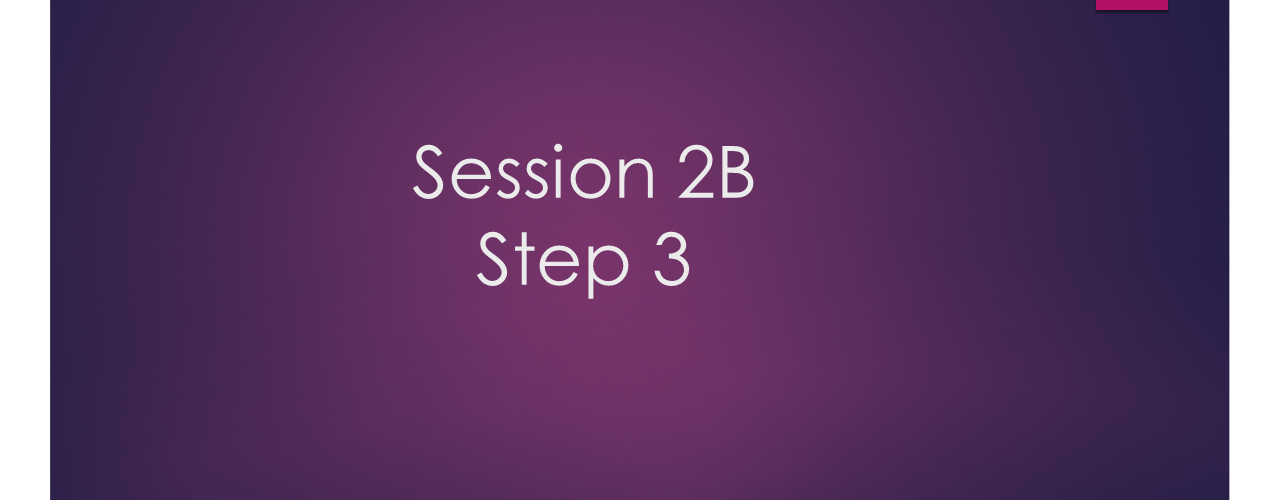Step 3: Creating Hope
In the second step, we’ve located the object of our faith: a personal Transcendent Power that is capable of restoring us to sanity. In this step, we’re going to find out how we can connect to that Power.
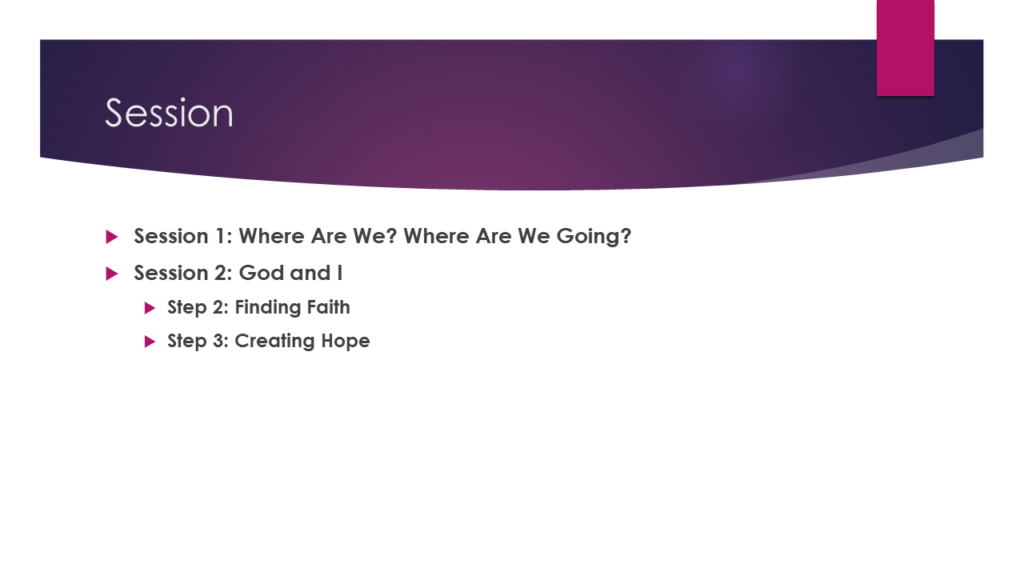
At this point, our faith is merely theoretical. There’s something there that is capable of helping us. How do we make it real? How can we capture that Power for ourselves? That’s where the third step comes in.
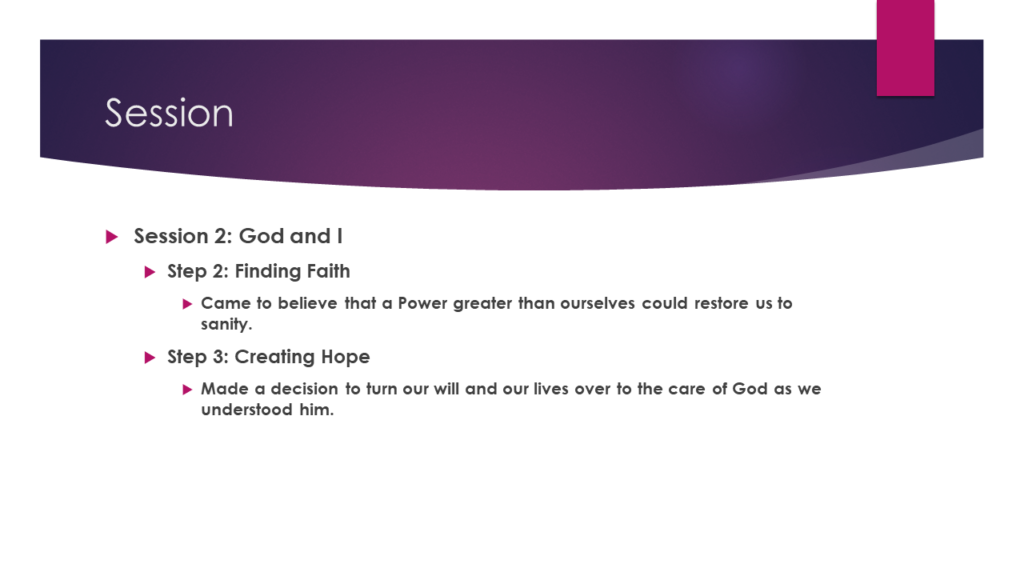
“Made a decision to turn our will and our lives over to the care of God as we understood him.” Hoo, boy! That’s a big order, isn’t it? Who would get to the point in their lives to be willing to surrender their will and their life to another? The answer to that question lies all the way back in the first step: those who have finally admitted that their way doesn’t work, that their lives are out of control, and that they are powerless to fix them. That’s who.
Many people have literally died from their spiritual disease after having made it to this point, because they were incapable of taking the third step. What blocked them? We learned that the second step—faith—is purely theoretical. Something was missing that prevented those people from putting their faith into practice. There are three essential attitudes that make the third step possible. Without any one of them, people can’t escape from the uncontrollability of their lives. Here they are. The first essential attitude is honesty.
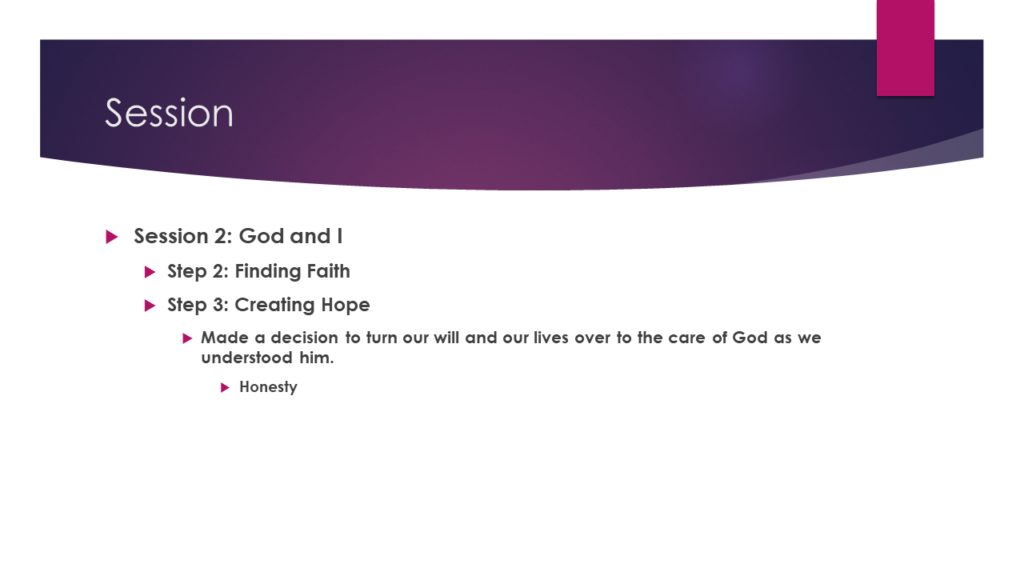
Rigorous honesty is absolutely critical. Without it, stop right here. Before anyone can turn their will and their lives over to the care of another, they must take the time and go through the pain of knowing themselves. We must be able to break through the denial, the blame, the avoidance, and the self-pity that blinds us to what’s going on inside us. Honesty demands that we take off our masks; and honesty requires that we give up the role-play and pretense that distorts who we really are in our own eyes, as well as the eyes of the world. It’s time to take a good look in the mirror. If that takes outside help and therapy to get through the smokescreen that hides our real selves, so be it. Once we’ve gotten honest with ourselves, only then can we be honest with others. Not just honesty in our dealings with them—that’s a basic prerequisite—but honestly showing them who we really are rather than who we want them to think we are. Rigorous honesty can be tough to achieve.
The second essential attitude is openness.
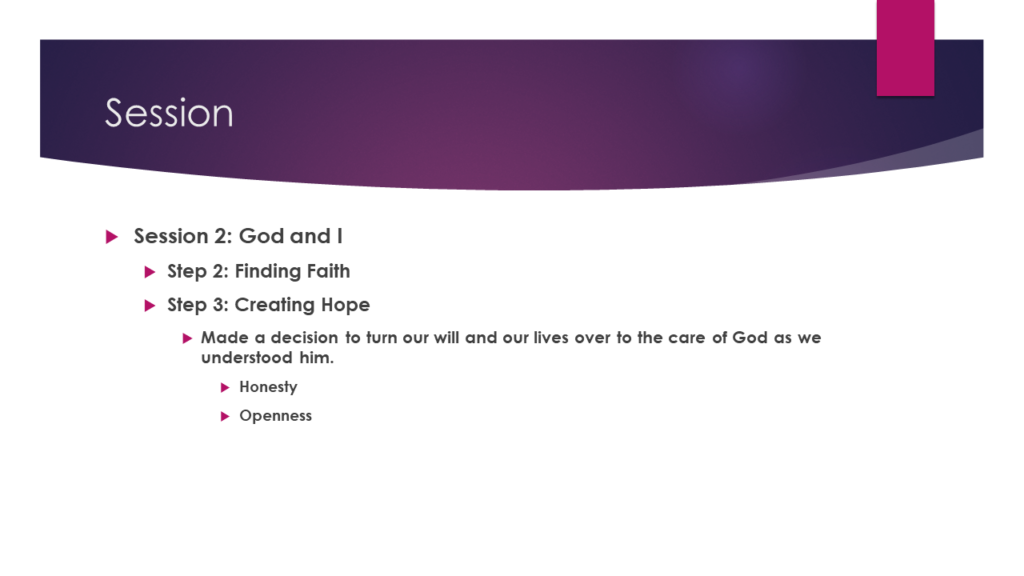
If rigorous honesty is difficult to achieve, then you may find that openness is equally difficult. The illusion of control demands that I be right, sometimes, most of the time, or always. Our knowledge, experience, and opinion can become sacrosanct and may not be challenged, even by evidence to the contrary. Uncertainty calls into question our infallibility and omnipotence. How difficult it is for us to admit uncertainty…to say, “I don’t know.” Yet our need to be right blocks out any conflicting ideas. Without openness, new ways of thinking and behaving become impossible. True openness is willing to admit, “You may be right;” and, the reverse, “I may be wrong.” Openness allows us to become comfortable with uncertainty. The Transcendent—God—is beyond the certainty of our knowledge and understanding. Openness allows us to live with that uncertainty. Indeed, in time, we may become comfortable with it. A new spirituality—a new way of life—demands that we be open to and comfortable with the unknown.
The third and final essential attitude is willingness.
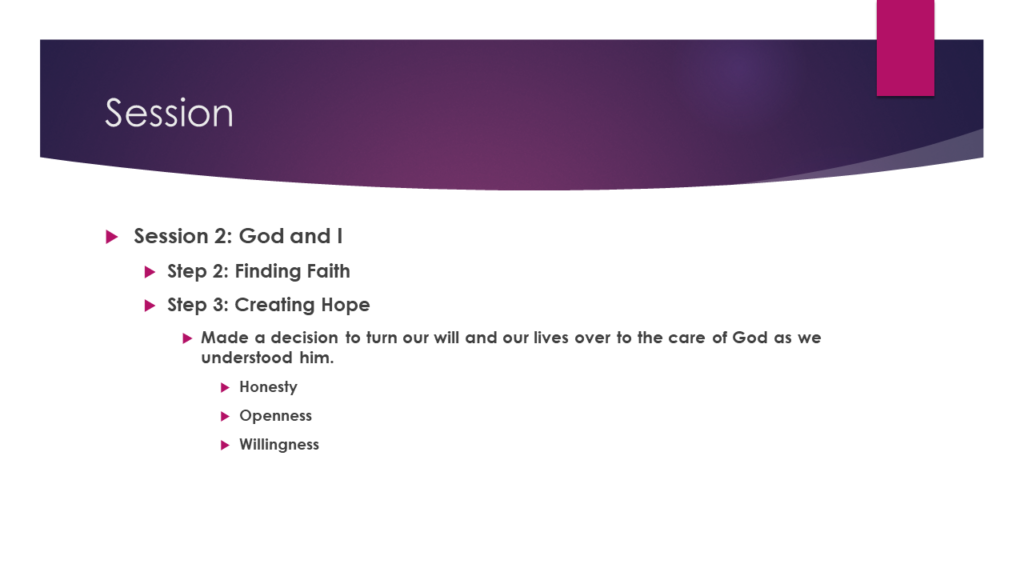
We may find the honesty to come to the table as we really are, unadorned and without pretense. We may become open to the possibility of new ways of thinking and behaving. However, without the willingness to step out of our comfort zone and commit ourselves to something new, something foreign, something that feels dangerous, we’ll never be able to take the third step.
Here’s a major sign of the spiritual disease: an intractable unwillingness to ask for help. It’s the old “I’ve got this” and “I can’t imagine this applies to me” attitudes all over again. After all, the decision to turn our will and our lives over to a Power greater than ourselves is the result of our need to look outside of ourselves for the help we require to make our lives more manageable—and to turn to our higher Power for it. Right now, we have the opportunity to ask the crucial question: “What’s preventing me from asking for help?” This is our chance to see how our bruised egos try to limit our willingness to take the steps necessary to reach outside of ourselves. Before we can take the third step, we’ve got to be prepared to say, “I’m ready and willing to do whatever it takes.”
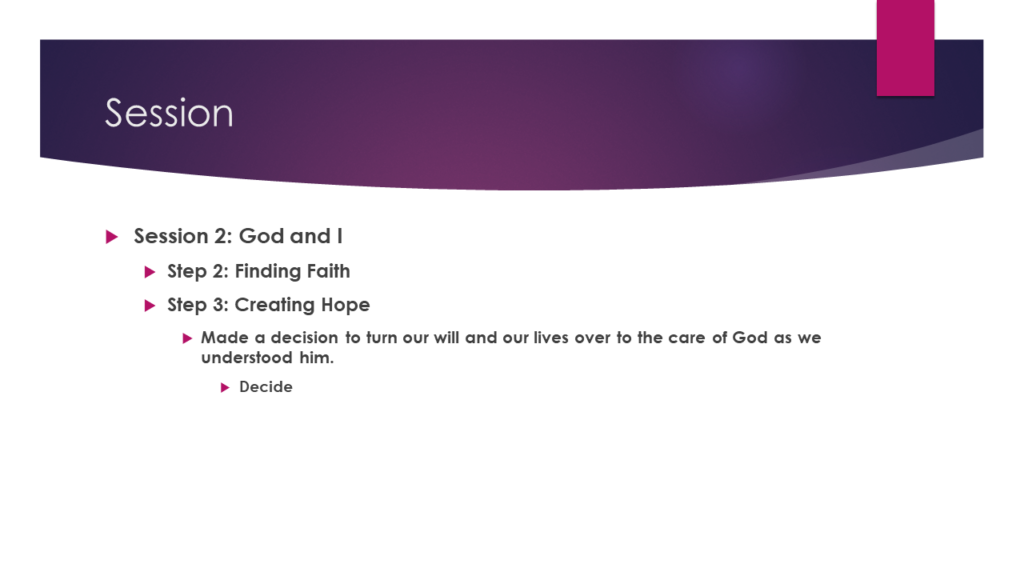
It’s a good thing we just talked seriously about willingness because making a decision is an act of the will. If we’ve been able to take the first two steps successfully and have managed to accept our unmanageability, our powerlessness, our insanity, and that there’s a Power greater than ourselves that can restore us, then making this decision could be fairly straightforward. However, doubts can and do arise. Maybe life isn’t so out of our control. Maybe I can control my life myself. Maybe I’m not that divorced from reality. When these doubts arise, then making the decision in step three can be a challenge. Deciding to turn our will and our lives over to God has to happen over and over again. “Turn it over” becomes our mantra. “Let go, and let God,” we’re told. Believe it or not, it seems easier to hold on to our old ways of thinking even when they’re hurting us. When doubts arise, we may need to be reminded to “Let go or be dragged.”
It’s probably a good idea right now to say a word about dependence. We Americans, more than almost any other nation on earth, cherish our independence. Almost instinctively, we put our personal rights over the rights of the group—any group. We insist fiercely that nobody can tell us what to do, or not to do. This kind of rugged individualism is a serious liability for anyone who has accepted that they are powerless, that life has become unmanageable, and that a Power greater than themselves can restore them to sanity. That knowledge should lead them directly to the third step which asks them to become dependent on a Power outside themselves, and that’s distasteful at best. We need to be reminded again and again about our consistent failures. Our powerlessness is real. Depending primarily on ourselves doesn’t work. It’s time to look to another Power for guidance and strength. It’s not an unhealthy dependence. It’s simply letting God be God because God can handle it and we’ve done such a poor job at it.
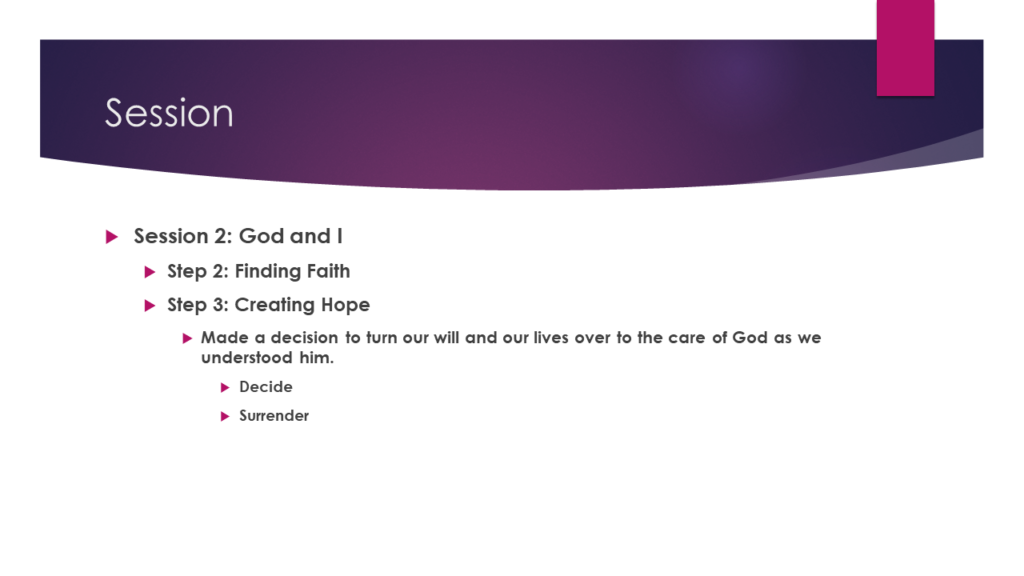
In step two, we learned to accept ourselves and the Power greater than ourselves, which we’re calling God. It’s not necessary to define God—it can’t be done, at least not adequately. It’s sufficient to accept that God exists. In order to heal our spiritual sickness, we’ve learned that we have to establish a relationship with God. That means we have to trust not only that God could help us, but that God would help us—if we’d only let him. It’s our trust in God—our hope—that takes us from the theoretical to the practical, from accepting that God exists to surrendering to God. Hope is trust in action. We’ll never surrender our will and our lives until we can trust the One to whom we’re surrendering. If we can’t trust God, whom can we trust?
When you are prepared to turn your will and your life over to the care of God, it’s suggested that you carefully and mindfully pray the following prayer…and mean it:
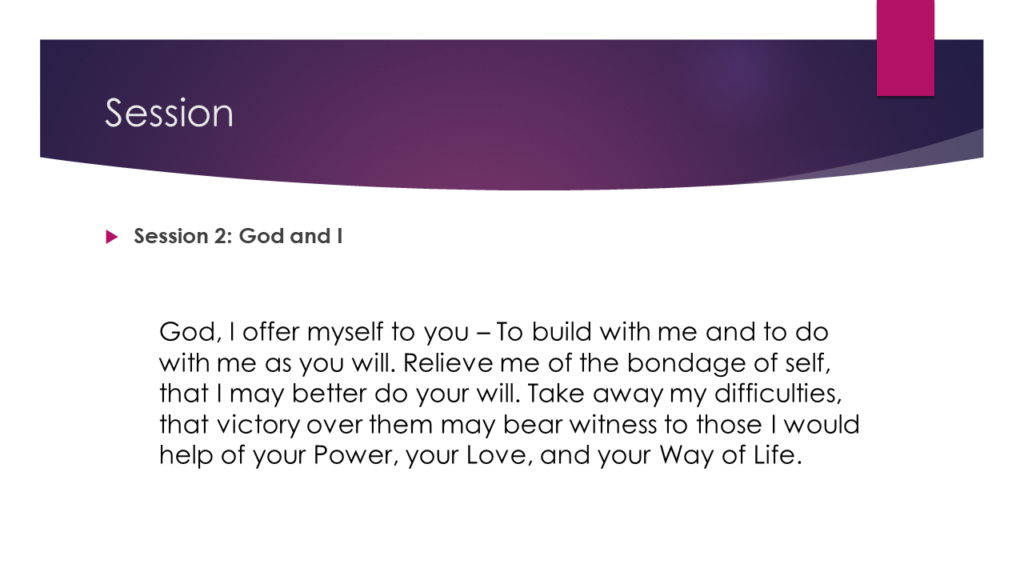
The consequences of taking this step can be profound, and it can set you on the path to the rest of your journey of spiritual growth.
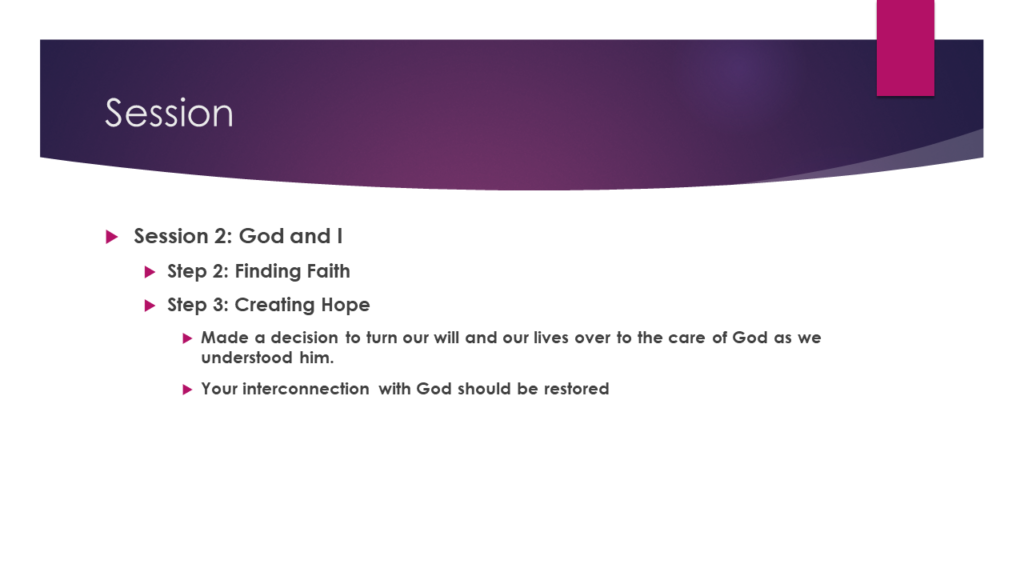
Congratulations! If we’ve successfully taken the first three steps, our interconnection with God has been reestablished and our interrelationship with God has been restored. The spiritual channels are now open. What remains is to clear out the static on the channel that blocks us from reestablishing our relationship with ourselves. The Power greater than ourselves is available to us, as soon as we allow it to flow. Our first use of that Power should be to help us clean up our messes. That’s where the next two steps come in.
